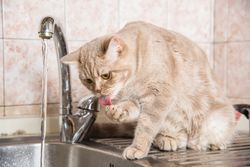4 Common Well Water Contaminants to Watch For

Homeowners must schedule regular well inspections to ensure their water is safe for consumption and bathing. This assessment will include looking for common contaminants that may enter the well from the groundwater. Below are four common impurities water well technicians will test for.
What Water Well Contaminants Should You Test For?
1. Arsenic
Arsenic is a naturally occurring substance found in dirt and rocks. The element is also created when coal burns and during mining processes. Arsenic can be found in groundwater when industrial waste or fertilizers sink into the lakes and streams. The Environmental Protection Agency’s well water standards allow for up to 0.01 milligrams of arsenic per liter of water to avoid health issues like bladder and lung cancer that can occur from exposure to higher levels.
2. Microbes
 When contemplating water contaminants, many people think of chemicals and human-made substances. However, natural microbes like bacteria can also wreak havoc on your well water and make people sick. Giardia is one of the top concerns. These parasites are transported from fecal matter into bodies of water and may enter wells. Humans and pets who are exposed to giardia may experience extreme flu-like symptoms like gastrointestinal distress. Getting regular well inspections includes checking for giardia and preventing it from affecting your household.
When contemplating water contaminants, many people think of chemicals and human-made substances. However, natural microbes like bacteria can also wreak havoc on your well water and make people sick. Giardia is one of the top concerns. These parasites are transported from fecal matter into bodies of water and may enter wells. Humans and pets who are exposed to giardia may experience extreme flu-like symptoms like gastrointestinal distress. Getting regular well inspections includes checking for giardia and preventing it from affecting your household.
3. Nitrate
Rural areas have an increased likelihood of nitrate well contamination because of the proximity to agricultural operations. This inorganic compound contains nitrogen and oxygen and is used in fertilizers to promote plant growth. High-quality well water should have less than 10 milligrams of nitrate per liter of water to avoid health issues like methemoglobinemia, which is a condition that affects blood oxygen levels.
4. Radon
Residential water wells can feature radon, an odorless, colorless gas that is radioactive and occurs in nature. Most health issues associated with radon involve the gas form, but when the material is dispersed in water, it can release gas into the area as the droplets are disturbed. Aeration and granular activated carbon can reduce radon levels with a point-of-entry device to ensure none of the water entering the home is contaminated.
Homeowners should schedule regular well inspections with Gainous Well Drilling in Grady County, GA, to ensure their water is safe. The family-owned company is licensed and bonded and offers well drilling, testing, and irrigation system services. Call the Cairo-area drilling contractors at (229) 377-7883. Visit the website for information on their wide range of water-related offerings for your home, business, or agricultural entity.
About the Business
Have a question? Ask the experts!
Send your question

